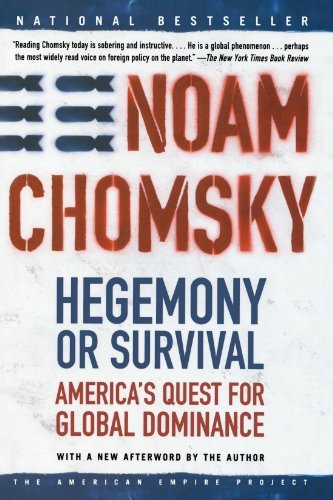
An immediate national bestseller, Hegemony or Survival demonstrates how, for more than half a century the United States has been pursuing a grand imperial strategy with the aim of staking out the globe. Our leaders have shown themselves willing-as in the Cuban missile crisis-to follow the dream of dominance no matter how high the risks. World-renowned intellectual Noam Chomsky investigates how we came to this perilous moment and why our rulers are willing to jeopardize the future of our species. With the striking logic that is his trademark, Chomsky tracks the U.S. government's aggressive pursuit of "full spectrum dominance" and vividly lays out how the most recent manifestations of the politics of global control-from unilateralism to the dismantling of international agreements to state terrorism-cohere in a drive for hegemony that ultimately threatens our existence. Lucidly written, thoroughly documented, and featuring a new afterword by the author, Hegemony or Survival is a definitive statement from one of today's most influential thinkers.
Author

Avram Noam Chomsky is an American linguist, philosopher, political activist, author, and lecturer. He is an Institute Professor and professor emeritus of linguistics at the Massachusetts Institute of Technology. Chomsky is credited with the creation of the theory of generative grammar, considered to be one of the most significant contributions to the field of linguistics made in the 20th century. He also helped spark the cognitive revolution in psychology through his review of B. F. Skinner's Verbal Behavior, in which he challenged the behaviorist approach to the study of behavior and language dominant in the 1950s. His naturalistic approach to the study of language has affected the philosophy of language and mind. He is also credited with the establishment of the Chomsky hierarchy, a classification of formal languages in terms of their generative power. Beginning with his critique of the Vietnam War in the 1960s, Chomsky has become more widely known for his media criticism and political activism, and for his criticism of the foreign policy of the United States and other governments. According to the Arts and Humanities Citation Index in 1992, Chomsky was cited as a source more often than any other living scholar during the 1980–1992 time period, and was the eighth-most cited scholar in any time period.